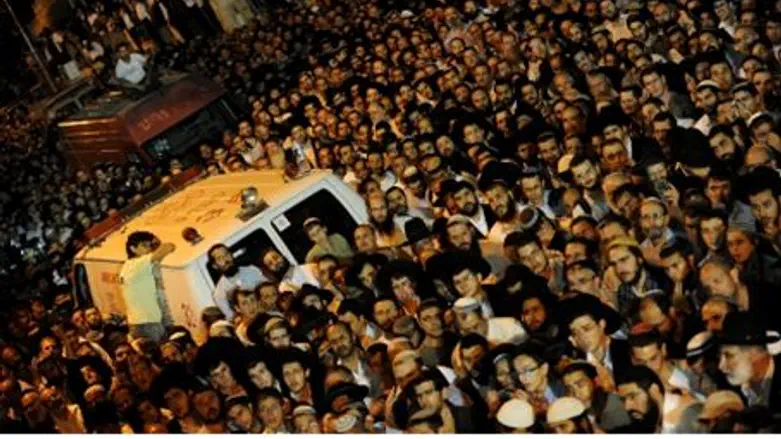
Just as Jews from throughout the country were preparing to gather to pray for the health of former Chief Rabbi HaRishon LeTzion, Rav Mordechai Eliyahu, news of his death reached the nation.
Over 100,000 mourners, Sephardi, Ashkenazi, knitted and black skullcapped, participated in the Jerusalem funeral, which began at 10:00 PM and ended close to 1:00 AM due to the slow movement of the throngs that surrounded the funeral car. . Both sides of the Jerusalem-Tel Aviv hghway approaching Jerusalem were filled with parked cars whose passengers simply parked and walked from the intercity road to the funeral.
Rabbi Eliyahu, 81, was the revered spiritual leader of the religious-Zionist world for many years, respected by all streams for his brilliance, erudition and kindness. His encylopedic knowledge of all areas of Jewish Law was legendary. He encouraged settlement of all of the land of Israel, opposed the expulsion from Gush Katif and expressed disbelief that it could occur in a Jewish country.
Hospitalized for nearly a year in Jerusalem's Shaarei Zedek Medical Center, his condition was once again downgraded to "critical” earlier in the day. As reports went out that the sage's condition had severely deteriorated, people were organizing prayer rallies for his recovery. Family members were called to his bedside and were by his side when he passed away. His sons said Tehillim (Psalms) around his bed from the time of death until the funeral.
The funeral departed from Heichal Yaakov, the rabbi's synagogue and Torah study hall, located near the Eliyahu family residence in Jerusalem's Kiryat Moshe neighborhood. The police closed the streets in the area, and were out in large numbers.
Prime Minister Binyamin Netanyahu issued a statement expressing the national sadness at the loss of a great rabbinic leader.The leaders of Israel's rabbinic world spoke at the funeral, including Sefardic Chief Rabbi Shlomo Amar and the Ashkenazi Chief Rabbi Yona Metzger.
Upon hearing the news, Rabbi Chaim Druckman, head of the Bnei Akiva Yeshiva Movement and the Ohr Etzion Yeshiva, cried in a tear-choked voice: "We are orphaned, left without a father..."
 Jerusalem Mayor Nir Barkat, who studies Torah weekly with Rav Zaafrani, Rav Eliayhu's longtime assistant and who delivered a short eulogy at the funeral, said earlier, “I am a partner to the heavy mourning of the Nation of Israel in general, and of Jerusalem in particular, on the passing of the great Torah leader, father and rabbi to myriads, and from whom I was privileged to benefit from his proximity and learn from his wisdom. Rabbi Mordechai Eliylahu, who engraved on his flag love of
Jerusalem Mayor Nir Barkat, who studies Torah weekly with Rav Zaafrani, Rav Eliayhu's longtime assistant and who delivered a short eulogy at the funeral, said earlier, “I am a partner to the heavy mourning of the Nation of Israel in general, and of Jerusalem in particular, on the passing of the great Torah leader, father and rabbi to myriads, and from whom I was privileged to benefit from his proximity and learn from his wisdom. Rabbi Mordechai Eliylahu, who engraved on his flag love of
Rabbi Shalom Dov Wolpe of the Land of Israel Task Force said, “One of the great leaders of the People of Israel has been lost. He fought bravely for the integrity of the Land of Israel, and the love of Israel beat in his heart. The loss of righteous people is as terrible as the burning of the House of our G-d; who can replace him? All of those loyal to the Torah of Israel and the Land of Israel must strengthen themselves and continue in his path. We express our condolences to his son and follower in his path, Rabbi Shmuel Eliyahu.”
The National Union and Jewish Home parties issued a joint statement of mourning for the loss of Rabbi Eliyahu, as did the Hevron Jewish Community. For years, Rav Eliahu visited Hevron to lead the Slichot prayers during the High Holy Day period.
The Binyamin and Shomron Residents Committee issued this statement: “We bitterly mourn the loss of Rabbi Mordechai Eliyahu of saintly blessed memory. The Rabbi was the pillar of fire that walked before the camp of the residents of Judea and Samaria, encouraged them at their difficult hours and worked to helped them.”
Rabbi Mordechai Eliyahu was born in 1929 in the Old City of Jerusalem to an illustrious Baghdad family; his father was a renowned Kabbalist and his mother was a granddaughter of the famed Ben Ish Chai's sister. He was recognized as a prodigy at a young age and went on to become Israel's youngest Rabbinical Court Judge.
Rabbi Eliyahu served as Israel’s Chief Sephardic Rabbi - the Rishon LeTzion – from 1983 until 1993, together with the late Rabbi Avraham Shapira. The two Torah giants, who were fast friends, continued to lead the national-religious public in matters of Jewish Law and philosophy for years following the end of their official terms in office.
Rabbi Eliyahu gave weekly Torah lectures, authored several legal and philosophical works and was close to many leading rabbis, including the Chazon Ish, the Lubavitcher Rebbe and Rabbi Yitzhak Nissim. He also served as personal rabbi to Prisoner of Zion Jonathan Pollard. Rabbi Eliyahu headed the Keren Moreshet network of Torah core groups that settled in various cities throughout the country. For years, the beloved rabbi would sit in his Kiryat Moshe Synagogue each day answering hundreds of legal questions and dispensing advice to the endless streams of people of all stripes who sought to profit from his wisdom.
The sage was in pain for months. His wife, Rabbanit Tzvia Eliyahu, recently told a Radio Kol Chai interviewer that the Rav had told her that he was prepared to suffer if he could only save the Jewish people from suffering.